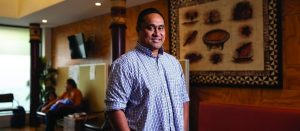Lemalu Silao Vaisola-Sefo
Chief Executive Officer
South Seas Healthcare
Overnight, healthcare providers across the world, big and small, had to change why and how they used social media. What was once used to communicate information more generally to patients and the community, providers found themselves at the forefront of an international vaccination campaign where social media is crucial to get as many eligible people protected from COVID-19 as possible. Vulnerable communities are often left outside of the mainstream ‘Unite Against COVID-19’ response, not reaching and/or being understood by large segments of the population, especially here in Aotearoa. Targeted social media vaccination campaigns became key to informing these communities, where sites like Facebook, Instagram and TikTok are used heavily.
We need to strengthen healthcare’s ability to disseminate information during a pandemic. Providers must effectively use the voices of professionals in the sector, working in the communities they care for, to combat misinformation in all its forms. The toolbox of marketing and promotion, and the ethical responsibilities that come with it, should be commonplace in healthcare even as the response to COVID-19 shifts to a new normal. Misinformation is bred out of a breakdown in communication, most notably in communities historically misunderstood and misrepresented in Aotearoa’s mainstream media narratives. Achieving an effective national response is impossible unless information reaches everyone, and everyone understands it and correctly acts on it. Government organisations and initiatives were set up to reach communities where language and cultural barriers exist but with little-to-no online presence on social media platforms. Councils, churches, community groups and healthcare providers, who had connections and followings both offline and online, suddenly found themselves with the only means to effectively communicate official COVID-19 health information to their communities. The eligibility of groups, for example, changing during the vaccination rollout required healthcare providers to engage with different demographics on the fly – taking into consideration that what resonates with one person might not for another.
As the world moves into a post-digital area, the expertise of professionals in localised healthcare must continue to find its way online. Regular content from doctors, nurses, and social workers, in different languages, on different topics and in different media forms should be explored and implemented as routine practice. Without it, misinformation will inevitably win over communities where mainstream media narratives fail and the algorithmic cultures of social media platforms prioritise engagement. With the reformation of the health system and public media, we need focus on this and what localised healthcare providers have to offer online in this new-normal media landscape.


